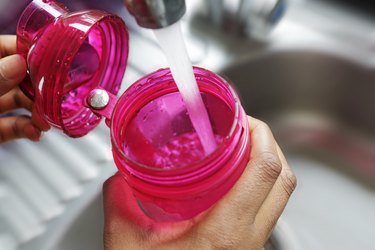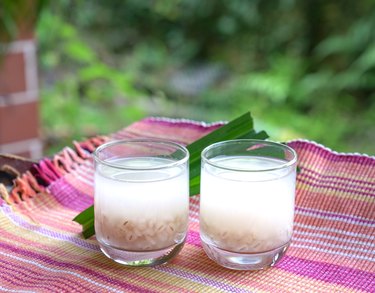
Reminders to drink more water are inescapable — they pop up in beautifully designed posts on social media and on water bottles with encouraging language scrawled on the side — and for great reasons: Water is essential to your body, helping to lubricate joints, maintain your temperature, remove waste and just generally keep every cell and organ functioning, per the American Academy of Family Physicians.
If you're on a weight-loss diet (doesn't matter which one), you'll inevitably hear about the connection between drinking water and weight-loss benefits. Whether you drink eight glasses of water per day or simply drink to quench your thirst, you cannot leave water out of a healthy diet and weight-loss regimen.
Video of the Day
Video of the Day
Here, we'll dig into the benefits of drinking water for weight loss and exactly how much H2O you should aim for each day. Plus, we'll take a look at mineral, barley and coconut water for weight loss.
4 Health Benefits of Water for Weight Loss
A properly hydrated body is a healthy body.
At least half — and as much as 75 percent — of your body is made up of water, according to PennState Extension. But every day you lose some of that water through routine activities, such as sweating, going to the bathroom and even breathing, per the Mayo Clinic.
If you don't replace the water you lose, you get dehydrated, leading to symptoms like headaches, muscle cramps, mood changes and more, according to the Cleveland Clinic. Not getting enough water is tough on your entire body, including your heart; when you're dehydrated, it's harder for your heart to pump blood, per the American Heart Association.
Simply put, without water, your body can't perform at its best.
1. Water Helps You Crush Your Workouts
Staying hydrated is particularly important when it comes to exercising (and of course, if you're trying to lose weight, workouts are likely part of your strategy).
Sweating your way through an hour-long workout (especially if it's hot out) could lead to losing more than a quart of water, according to the American Council on Exercise (ACE).
Aim to drink before, during and after exercising, per the ACE. This will help your body perform at its peak during your workout, and also ensure that you're replacing any fluids lost through sweat.
Warning
While staying hydrated is a good idea, don't overdo it. Drinking too much water can cause low sodium levels, according to the Mayo Clinic. This condition is known as hyponatremia and it can sometimes be deadly.
2. Water Has Zero Calories and Some Nutritional Benefits
Water is naturally calorie-free, fat-free and cholesterol-free. That means you can drink all you want without taking in empty calories, which can derail your weight-loss goals.
On the other hand, sweetened beverages are relatively high in calories. A can of soda, for example, has 192 calories, per the USDA, and a 16-ounce glass of apple juice has more than 200 calories, according to the USDA. Replacing these higher-calorie drinks with water can remove hundreds of calories from your diet.
If you're looking for a bit more flavor, opt for mineral water (more on that later) or squeeze a slice of lemon or lime into your glass of water.
If you dig into water's nutrition facts, you'll find that it has trace amounts of vitamins and minerals. The amounts and makeup differ depending on the source of the water.
Nutrition of Tap vs. Bottled Water
1 Cup Tap Water | 1 Cup Bottled Water | |
|---|---|---|
Calcium | 7.1 mg | 23.7 mg |
Magnesium | 2.4 mg | 5 mg |
Sodium | 9.5 mg | 5 mg |
3. Drinking Water Fills You Up, So You May Eat Less
Water won't add calories to your diet, but it can help you feel full, which could lead to eating less at mealtimes.
For instance, a small study of 15 people in their 20s found that drinking around a cup of water before a meal led to eating less, per October 2018 findings in Clinical Nutrition Research.
In a randomized trial, published August 2015 in Obesity, researchers divided adults with obesity into two groups: Some drank about 2 cups of water 30 minutes before mealtime, while others imagined having a full stomach prior to eating. The people who drank water lost more weight.
Researchers at the University of Illinois at Urbana-Champaign looked at a large sample of more than 18,000 adults who'd been interviewed about their food and water habits. People who drank 1 to 3 cups more water also decreased their daily calories by 68 to 205, per February 2016 findings in the Journal of Human Nutrition and Dietetics.
Don't Use Water as a Food Replacement
While water hydrates you and quenches thirst, it’s no substitute for food. When trying to lose weight, avoid using water to replace food.
Instead, if you’re looking to cut calories, drink water in place of sweet drinks like juice and soda.
You can also eat foods with high water content — such as soup or celery — to help meet your daily fluid needs.
Drinking only water to lose weight is neither safe nor sustainable. Your body needs both food and water to survive and function properly.
4. It Supports Your Metabolism
Drinking water — particularly cold water — can potentially increase your metabolic rate. That's the process your body uses to turn the calories you eat and drink into energy, according to the Mayo Clinic.
In one small study, 12 people drank either cold, room- or body-temperature water. Drinking both the cold and room-temperature water led to burning more calories, per the June 2014 study in Acta Physiologica. For 90 minutes after drinking the water, the participants burned 2.9 and 2.3 percent more calories, respectively, than those who drank the body-temperature water. Basically, the researchers concluded that you have to work harder to warm up the cooler water to body temperature.
But keep in mind that this effect is minimal and temporary. In other words, drinking ice water alone isn't an effective weight-loss strategy.
4 Benefits of Mineral Water for Weight Loss

Mineral water comes from springs and can be either still or sparkling. It has more nutrients and taste than pure water.
Not just any bottled water can be labeled mineral water. It has to contain a certain amount of minerals and come from an underground water source, according to the Food & Drug Administration (FDA). And mineral water distributors are not permitted to add minerals, per the FDA guidelines.
Many of the mineral water weight-loss benefits mirror the benefits of regular water — take a look:
1. It Has No Calories
Mineral water has zero calories — no need to look for "diet" mineral water, because it's naturally calorie-free.
Choosing mineral water instead of higher-calorie drinks, such as shakes, juice or sugary sodas, will save on calories, according to the Centers for Disease Control and Prevention (CDC). And taking in fewer calories overall can help you lose weight.
2. It Provides Nutrients
Mineral water is also a source of nutrients.
For instance, drink a cup of Cadia sparkling mineral water and you'll take in 40 milligrams of calcium, per the USDA.
Other minerals that may be in mineral water include chlorine, magnesium, potassium, sodium, iron, fluoride, manganese and copper, according to an article in the September-December 2016 issue of Clinical Cases in Mineral and Bone Metabolism.
3. It Keeps You Hydrated
Just like plain H2O, drinking mineral water can help you stay hydrated and ward off dehydration. This helps you feel your best, because dehydration can cause tiredness and lack of energy, along with other unpleasant symptoms.
Mineral water — which is often sparkling, and also has more of a taste profile than regular water — can be a good way to encourage drinking if you find tap or bottled water dull.
4. It May Help Heart Health
Drinking water — of any variety — will help with hydration, which makes it easier for your heart to pump blood (that's especially helpful when you're exercising).
But there may be some specific heart-healthy benefits to mineral water.
One small study of 16 people compared the effects of drinking mineral and distilled water. An hour after drinking, the people who had mineral water had a decreased heart rate compared to those who had distilled water, per August 2020 findings in the Journal of Functional Foods.
Adding calcium and magnesium — which are often naturally found in mineral water — to water may help lower blood pressure, according to a May 2019 study in the Journal of the American Heart Association. That tracks with earlier findings that high levels of magnesium in water are associated with a lower risk of dying due to coronary heart disease, per a January 2016 meta-analysis in Nutrients.
More research is needed to fully understand the benefits of minerals for heart health.
Related Reading
The Benefits of Coconut Water for Weight Loss

Coconut water, also known as coconut juice, is the liquid naturally found inside coconuts, per the Mayo Clinic.
You can easily find coconut water in grocery or health food stores, and it's often touted for its health properties. But keep in mind that while it has "water" in its name, coconut water is really a juice, which means its nutritional makeup is different from calorie- and sugar-free water.
According to the USDA, a cup of coconut water has:
- 46 calories
- 0.5 g fat
- 0.4 g saturated fat
- 252 mg sodium
- 8.9 g carbs
- 2.6 g fiber
- 6.3 g sugar
- 1.7 g protein
That's fewer sugars and calories than most other juices. A cup of orange juice, for instance, has 112 calories, 20.8 grams of sugar and the same amounts of fat and protein as coconut water, according to the USDA.
It's Low in Calories Compared to Other Drinks
If you're wondering if coconut water is good for weight loss, the answer is "maybe."
If you're drinking coconut water in place of a higher-calorie drink (like soda, for example), it can help you lose weight over time because you'll be taking in fewer calories in total. Still, there's no question that drinking water (which has zero calories) is the better option.
That said, because coconut water contains calcium, sodium and potassium — electrolytes that help your body maintain the proper balance of fluids — you might consider opting for coconut water in place of an electrolyte-rich sports drink, per the Cleveland Clinic.
But be mindful that the balance of minerals in this beverage might not be ideal for recovery: Compared to sports drinks, coconut water is lower in sodium, according to The Ohio State University Wexner Medical Center.
Does Barley Water Benefit Weight Loss?

Barley is one of the world's oldest grains, according to the Oldways Whole Grains Council.
Barley water's benefits haven't been well studied, but because it's made from a fiber-rich grain, it may offer some weight-loss perks.
One cup of cooked pearled barley has 6 grams of fiber, per the USDA. Fiber can help with weight loss because fiber-rich foods have a lot of nutrients without a lot of calories. That said, it's hard to know how much of barley's fiber is present in barley water.
It's a bit difficult to pin down barley water's nutrition facts — 3 ounces of Robinsons Lemon Barley Water has 96 calories, 20 grams of sugar and 22 grams of carbohydrates. That same brand, however, lists sugar as the second ingredient. Nutritional information can also vary based on how barley water is strained, the sugar content and whether you make it at home.
How to Make Barley Water
To make barley water, simmer hulled or pearled barley, then save the cooking water to drink. Adjust the ratio of barley to water to suit your taste. A typical starting point is 1 cup of barley to 8 cups of water, cooked for 30 minutes.
Some of the grain’s nutrients — and flavor — will remain in the water.
You can bump up the flavor of the barley water by simmering the mixture with cinnamon sticks or ginger. And you can add mint leaves or citrus juice once the water is off the heat. You can also add sweeteners such as honey and agave (just note they’ll increase the drink's calorie count).
You can enjoy this beverage hot or cold.
How Much Water to Drink a Day for Weight Loss
Given all of these benefits, it's natural to wonder if you should be drinking more water, and if so, how much. Here, we break down the math around water and weight loss.
Tip
You’ll see the biggest weight-loss benefits if you were previously drinking high-calorie beverages and switch to only drinking water.
The truth is, although you'll often hear 12 glasses of water or 8 cups of water a day mentioned as recommendations — or sometimes even 90 or 96 ounces of water from some sources — there is no hard-and-fast rule when it comes to how many cups of water you're supposed to drink a day.
Here's what to keep in mind: Adults should aim to get 2.7 to 3.7 liters of total water each day, according to the U.S. National Academies of Sciences, Engineering and Medicine — that's about 11.5 to 15.5 cups per day, or about 92 to 124 ounces.
If that sounds like a lot of liquid, keep in mind that you get fluids from a lot of sources, including other beverages (like your morning cup of coffee or tea) as well as from foods. About 20 percent of your daily fluid comes from food, per the Mayo Clinic.
So, because you’ll get some fluids from food, you’ll only need to drink between 9 and 12.5 cups of fluids each day, per the Academy of Nutrition and Dietetics. (That's 72 to 100 ounces, for the record.)
But this recommendation isn't set in stone: Hydration needs vary based on several factors, such as your age, weight and activity levels, according to the U.S. National Library of Medicine.
For instance, if you're training for a marathon and running long distances daily, you'll need more water than someone who works out three times a week. Plus, if it's hot and humid outdoors, your hydration needs will increase.
Tip
The Mayo Clinic says there are two key signs that you’re well hydrated: You rarely feel thirsty and your urine is either colorless or pale yellow.
How to Drink More Water
"Drink more water" sounds so simple, and yet so many of us reach the end of the day without getting anywhere close to drinking the recommended 9 to 12.5 cups.
The best strategy to drink more water is a simple one: When you're thirsty, drink. Here are some other tips to up your water consumption:
- Always have it on hand. Get a water bottle and carry it with you on walks, to the car and so on — this way, you'll always be able to drink.
- Jazz it up. If you find plain water dull, try opting for fizzy options, or putting lemon, lime, cucumber slices, crushed fruit, mint leaves or other zero- or low-calorie add-ins in your glass.
- Use a straw. Drinking out of a glass with a straw — or a water bottle with a spout — may encourage you to drink more.
- Drink water throughout the day. Along with drinking at mealtime, keep a cup on your desk during the workday, for example.
Keep in mind that other beverages you drink — such as your morning cup of coffee or tea — count toward your daily fluid needs, and that the food you eat contributes, as well.
- American Academy of Family Physicians: "Hydration: Why It’s So Important"
- Penn State Extension: "Water, Water Everywhere"
- Mayo Clinic: "Water: How much should you drink every day?"
- Cleveland Clinic: "Dehydration"
- American Council on Exercise: "Healthy Hydration"
- American Council on Exercise: "How Hydration Affects Performance"
- USDA: "Tap Water"
- USDA: "Bottled Water"
- Clinical Nutrition Research: "Effect of Pre-meal Water Consumption on Energy Intake and Satiety in Non-obese Young Adults"
- Obesity: "Efficacy of water preloading before main meals as a strategy for weight loss in primary care patients with obesity: RCT"
- Journal of Human Nutrition and Dietetics: "Plain water consumption in relation to energy intake and diet quality among US adults, 2005–2012"
- Mayo Clinic: "Metabolism and weight loss: How you burn calories"
- Acta Physiologica: "Cardiovascular and metabolic responses to tap water ingestion in young humans: does the water temperature matter?"
- FDA: "CFR - Code of Federal Regulations Title 21"
- Centers for Disease Control and Prevention: "Rethink Your Drink"
- USDA: "Sprite"
- USDA: "Cadia - Cadia Sparkling Italian Mineral Water"
- Clinical Cases in Mineral and Bone Metabolism: "Natural mineral waters: chemical characteristics and health effects"
- Journal of Functional Food: "Short-term cardiovascular responses to ingestion of mineral water in healthy non-obese adults: Impact of mineral components"
- Journal of the American Heart Association: "Drinking Water Salinity, Urinary Macro‐Mineral Excretions, and Blood Pressure in the Southwest Coastal Population of Bangladesh"
- Nutrients: "Magnesium Levels in Drinking Water and Coronary Heart Disease Mortality Risk: A Meta-Analysis"
- Mayo Clinic: "What is coconut water and what's behind the hype?"
- USDA: "Coconut Water"
- USDA: "Orange Juice"
- Cleveland Clinic: "Electrolyte Drinks: Beneficial or Not?"
- The Ohio State University Wexner Medical Center: "Is coconut water healthy?"
- Oldways Whole Grains Council: "Barley - February Grain of the Month"
- USDA: "Cooked Pearled Barley"
- U.S. National Academies of Sciences, Engineering and Medicine: "Dietary Reference Intakes for Water, Potassium, Sodium, Chloride, and Sulfate"
- Academy of Nutrition and Dietetics: "How Much Water Do You Need"
- U.S. National Library of Medicine: "Water in diet"
- American Heart Association: "Staying Hydrated - Staying Healthy"